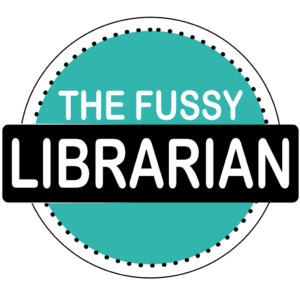Award Winning Author Julie Smith: A Look at Her Journey From Reporter, to Novelist, to Publisher
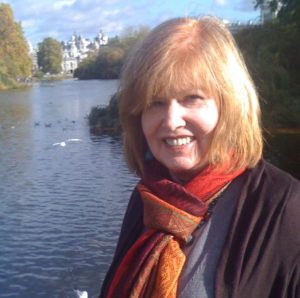
Julie Smith is a traditionally published author of two dozen novels and as many short stories who, over the last ten years, has become a publisher, author, marketer, and advocate for indie authors. She’s the author of four popular mystery series and winner of the coveted Edgar Allan Poe Award for Best Novel.
We chatted with her about the transition from journalism to writing novels, and how she’s found success with free ebook promotions of her books as well as the other authors she works with.
Fussy Librarian: First, it’s great to talk to a fellow recovering journalist. We have such similar stories – both working as newspaper reporters before getting the itch to write a novel. I found that, during my first novel, I wrote a lot in the short sentence structure that newspapers require, and that it wasn’t until the second novel that I fully made the transition to “novelist.” Was it easier for you or did you go through a similar process?
Smith: It happened a little differently for me. I think I first wanted to write a novel at about age seven. I thought journalism would be a good way to make a living writing while learning skills (and having experiences) that might help a novelist. And I was right! I found I learned the most valuable skill a novelist can have is not being afraid of a blank screen. (Although in those days it was a blank page.)
But was it easy? Absolutely not! (The emphasis is for readers who are struggling with their first novel. Because I want to reassure everyone it’s not just you — it’s always a struggle.)
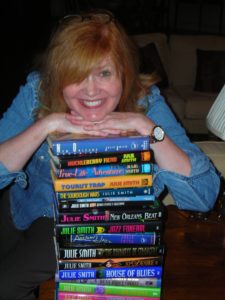
Fussy Librarian: You were a reporter in New Orleans and San Francisco, which are two of the great towns in which to be a journalist. I’m going to guess you met a lot of colorful characters that you later adapted for fiction?
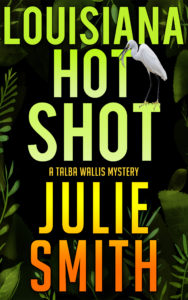
Smith: The most notable was the terrifying psychopath who went on to kill more people than anyone in the twentieth century who wasn’t a head of state.
Many people — even at my own paper — fell under the spell of the Rev. Jim Jones, but he made my scalp prickle from the first second I saw him.
It was years before I could write about him, but I ended up basing a recurring villain on Jones. It ends up taking Detective Skip Langdon three books to vanquish him.
Fussy Librarian: Success in traditional publishing did not come easy. As you’ve put it: “Seven years, five agents, hundreds of rejections, and six books.” Most people give up after the first or second book. What made you keep going during that time?
Smith: A really deep-seated desire, I think — to tell stories for a living. That is, to experience the joy of creating them. As a recovering journalist, did you ever notice how unsatisfying news stories can be? Because you can’t tie up the plot neatly and deliver a nice satisfying ending!
So, that and the fact that I think I was prepared for an uphill climb. Such is traditional publishing. I’m also grateful for the encouragement I got from colleagues in Mystery Writers of America. That may have helped as much as anything.
Fussy Librarian: It must have been so satisfying when “New Orleans Mourning” won an Edgar in 1991 for Best Mystery Novel.
Smith: It was indescribable. Like champagne popping in all your veins and capillaries. I worried all night about tripping in front of everyone if I won, and I ended up forgetting to be careful and actually running to the stage. In heels.

Fussy Librarian: So the Edgar opens some doors in traditional publishing and, I’m guessing, makes it easier to keep getting published. But at some point, you decided it made more sense to go the self-publishing route. Was it mainly a financial decision or did the freedom of “DIY everything” appeal to you? Or both?
Smith: Yes! Ed’s your best friend if you’re lucky enough to end up living with him. But it wasn’t really either of the above. I didn’t write for twelve years after Hurricane Katrina and for a while truly didn’t know what to do with myself. I wasn’t sure I’d ever write again, and I wanted to try something new. So when I got the idea of starting booksBnimble, it took hold like the idea of writing had in the first place. I was so excited I could hardly sleep — both about having a new project and about the potential of digital publishing.
Fussy Librarian: Before I ask about starting up your publishing company, I wanted go back to Hurricane Katrina in 2005. You were an exile in Dallas for about six weeks before returning to New Orleans. And suddenly it becomes unthinkable to just sit down and resume writing mystery novels. Can you talk a little about the journey to get back to a mindset where you could write mysteries again?
Smith: Writers seemed to have two different reactions to Katrina. One was to sit down at their laptops and turn it into art; the other was paralysis. I was unlucky enough to be paralyzed. Since my two current series were set in New Orleans, and all I could see was devastation, I could no longer visualize a landscape for them. Eventually I started booksBnimble (my publishing company) and become so busy with it that it replaced writing.
The decision to write again was financial. In indie publishing, as everyone knows, the best promotion for a series is a new book. One of my staff members, exasperated, finally said, “Look, if you’ll just write a book I’ll run the damn thing for awhile.” I called the book a “project” until I had a first draft. I wasn’t even sure I could do it. But it was just as much fun as always! Now I think I’ve got the writing jones again.
Fussy Librarian: In 2010, you became a publisher and opened booksBnimble. Many authors have trouble managing their own catalog, especially once they have ten or more books under their belt. What made you decide you wanted to juggle other writers in addition to your own catalog?
Smith: I started out that way! With four authors who weren’t me. At that time self-publishing carried such a stigma it never even occurred to me to try it. And then I happened to have lunch with my old buddy Mike Shatzkin, who’s now an ebook guru. Mike said, “What about your own books?” “Huh?” I said, or something equally alert. And Mike said, “Are you really so lame you can’t even publish your own books?” Well, that did it. My wonderful agent was able to get the rights back, and I published all of them. Never looked back. Now I’m all indie all the time.
Fussy Librarian: It looks like most, if not all, of the books by booksBNimble are enrolled in the Kindle Unlimited program. Could you walk us through the decision-making process to be exclusive to Amazon versus going wide on multiple platforms?
Smith: That’s a very short answer: I can make a lot more money that way. Many authors do well going wide. booksBnimble never did. We tried it, and it didn’t work. We still try it now and then, just to see. Nope. No comparison.
Fussy Librarian: Publishing has, understandably, slowed down your own writing. But you’re still writing new novels. How has working with other authors helped your own writing?
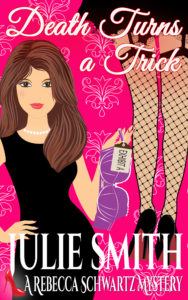
Smith: It might not have affected my writing so much as the way I publish my own work. In traditional publishing, there’s a kind of mongoose/cobra thing between authors and publishers that I truly hate. But when I became a publisher, I quickly went over to what many authors would consider the dark side — basing many decisions on profitability.
Let’s take covers as an example. They’re so personal, so tangled up with the author’s ego. But you can’t let personal taste and self-image stand in the way of success. If I was going to tell other authors to make commercial decisions, I had to do it myself — no authorial ego allowed. Insider tip: Humility required.
Fussy Librarian: You do a lot of free-ebook giveaways — both for your books and the authors that you publish. What was the thing that convinced you to do that?
Smith: We experimented and found that, over the ten years we’ve been in business, different strategies worked at different times. And, to tell the truth, as Amazon changes and refines its algorithms, nothing works as well as it used to except new releases. But free is pretty consistent.
Fussy Librarian: And giving away books can help an author make money. Could you explain how that works?
Smith: The short version is the loss-leader theory — also known as the best way to sell crack. Give someone a freebie and they’re hooked on the series. But there’s so much more to it! You could give away your whole series at once and still make a ton of money on it. Your best bet is to be both free and in KDP Select, because of the substantial amount you’ll make on pages. We get a lot of resistance to that. People think because free books count as sales, not as KU borrows, you’re not going to make money on pages. Actually, the opposite is true!
On a free run, your ranking does switch from sales to free, but when it switches back to the sales list coming off the run — if you’ve gotten enough free downloads — it jumps up the list, and sales spike for that day at full price. Ranking slowly comes back down to where it was before your free run in the few days after that. But in the meantime, while it was ranking high on the free list, KU customers grab it just because they saw it listed at high rank. Over the next couple weeks, they read it — and you get beaucoup royalties for pages! It’s a beautiful thing.
Fussy Librarian: What advice would you give authors about including free ebooks as part of their overall marketing strategy?
Smith: Run, don’t walk! But intersperse free with price promos as well.
Free can get tired, just like anything else. You have to vary marketing techniques, and keep an eye on changes and trends.
(Hence our name: booksBnimble. I chose that to help me remember how important it is to stay on your toes.)
Fussy Librarian: Reporting is a notoriously poor-paying job with very long hours. (I can vouch for this.) Has going the self-publishing route, and becoming a publisher, allowed you to do some things that wouldn’t have been possible if you were still working in newspapers?
Smith: It’s amazingly freeing! (Although I should mention that I had a long career as a traditionally published author between being a reporter and an indie evangelist. Everything about being a novelist permits freedoms reporters don’t get.)
But once you go indie, there’s no substitute for being your own boss and making your own decisions about your career. Can you make money? Astonishing money. Crazy money. Not everyone does, including me, but any talented writer who’s ambitious can do decently well. You need good marketing and a good series to do it, though. I can’t emphasize those two words enough — marketing and series. Even to be a modestly good seller, you need both.
One thing becoming a publisher allowed (and inspired) me to do was start a marketing arm, bBn Marketing (www.bbnmarketing.com). It began because I see so many people making exactly the wrong decisions for success and yet desperately wanting success. They often need better covers and better copy. They need advertising, most notably bargain and free promotions. They need to know the power of giving away books — literally hundreds of thousands of books.
For every free book, you get a new reader. You can have a truly gigantic audience if you give your books away. But after a cover refresh, this is the biggest thing writers resist — and the best thing they can do for themselves.
You can learn more about Julie’s digital publishing arm at www.booksBnimble.com and her marketing business at www.bbnmarketing.com.
Find her books on Amazon https://www.amazon.com/Julie-Smith/e/B000APETUW
To promote a free ebook with The Fussy Librarian, go to authors.thefussylibrarian.com.
